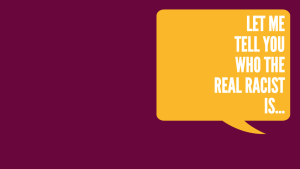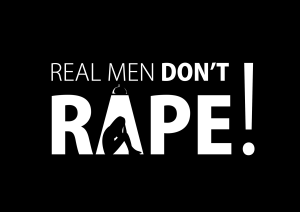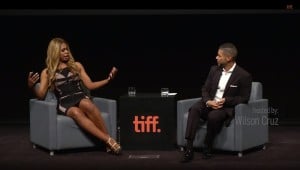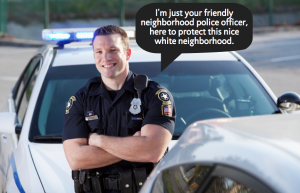
Source: Victor Hanson
Originally published on The Body Is Not an Apology and republished here with their permission.
Recently, during a training session for my work sector in a Muslim-majority country, a white American male associate started a discussion on gender development projects.
“There’s still so much oppression that these women have to endure,” he lectured. “We have to take initiative to start these female projects, and we have to start by going to the local authorities – who will be male – and helping them see these issues.”
As a woman of color intersectional feminist, I was immediately on edge and on guard at these words.
The familiar feelings began creeping in – frustration curling my fists and fear slithering down my spine. However, despite all that I wanted to scream about imperialism, imposition, paternalism, sustainability, and power dynamics, I simply took a deep breath and tackled one small aspect of his hugely problematic oration.
“Well,” I said, trying to keep my voice steady, “You know, there are local authorities who are not men.”
The man smiled indulgently at me. “Gender roles are different here, sweetheart,” he said. “Males have more power than females. I mean, you must understand. Isn’t it like that in your culture, too?”
This is Imperial Feminism, also known more accurately as Gendered Orientalism.
This is the kind of “feminism” that centers white narratives and strips away the agency of women of color. It places the West on a pedestal of gender empowerment, and thus ignores the systemic misogyny of Western nations.
It generalizes non-Western cultures. It promotes the dual image of the scary brown man and the white savior. This is the “feminism” of white people (especially, but not only, men) trying to save women of color. It appropriates women’s rights movements in the service of paternalism and empire.
This is why we need intersectionality: to fight against oppressive ideologies that use and abuse the idea of justice to perpetuate injustices. We must not let people get away with exploiting ideas of gender equality in order to enable racism.
In his groundbreaking 1978 book Orientalism, Edward Said wrote about the West’s oppressive conception of “the basic distinction between East and West as the starting point for elaborate theories, epics, novels, social descriptions, and political accounts concerning the Orient, its people, customs, ‘mind,’ destiny and so on.”
Orientalism is the West’s self-serving construction of the “East.” Gendered Orientalism is the Western construction of the East as inferior and therefore necessitating the West’s “intervention” and “aid.”
The Gendered Orientalism of this associate was unequivocally harmful, yet shrouded with the defense of intention. He did not think he was being racist or abusive or even slightly offensive.
In fact, he believed that he had the best of intentions. He truly believed (and will still continue to believe) that he is liberal and empathetic, that his words and actions fight against oppression rather than contribute to it.
Unfortunately, this is one of the insidious ways people with privilege contribute to cultural imperialism. “There’s still so much oppression that these women have to endure,” he said – not “all women,” not “women everywhere.”
His words otherize non-Western women and pinpoint sexism as a wholly non-Western problem. These women in this other country experience oppression. They have to endure it passively. These comments are misleading and damaging.
Not only that, but he denies women of color agency and heroizes himself and Western people who work in the developing world. “We, we, we, we, we,” he intoned. We have to take initiative. We have to go to the local authorities. We have to start these projects. We have to help them see. Because they obviously can’t fix any problems without the aid of the Great White Hero.
His condescension towards me is more than personally irritating. It is representative of how privileged people treat marginalized people. His disrespect of my work experience was evident and, regrettably, predictable. A white man arrogantly attempting to demean a woman of color is not new or shocking.
However, his otherization of me does speak to another axis of this systemic problem. In his imperialistic framework, non-Western nations are savage and misogynistic – in contrast to an enlightened and civilized West.
Not only that, but women of color in the West, like me, are also harmed by this juxtaposition. In this framework, women of color do not ever belong to the Western world.
I am someone from the Western world, someone who is an English speaker, and someone who works in a non-Western nation, and therefore I cannot escape the fact that I contribute to a legacy of imperialism, no matter my other intersections.
This is another complex discussion, but it is important to acknowledge my relation to these power dynamics. However, my privilege on this axis does not negate the marginalization I face from people like my co-worker. It is marginalization that is both individually and systemically patronizing.
Because of Gendered Orientalism, this man included my East Asian culture in his broad brushstroke as well. “I mean, you must understand,” he preened. “Isn’t it like that in your culture, too?”
Yes, I wanted to reply sarcastically, because apparently misogyny is only rampant in “exotic” cultures.
This is the truth: There is no culture or nation exempt from misogyny, in forms all across the spectrum. In all the cultures I belong to – and there are a few of them – gender discrimination is a vast and deeply rooted issue.
Yet Gendered Orientalism creates a binary in which otherized cultures are supposedly the only ones that remain the pit of savagery, and cultures with institutionalized power are supposedly the only ones that have progressed forward.
“Gender roles are different here,” he claimed. The usage of “different” does refer to a horizontal difference, but one with a power disparity. His words imply that he believes Western culture is superior to non-Western cultures.
Edward Said wrote, “The Orient and Islam have a kind of extra real, phenomenologically reduced status that puts them out of reach of everyone except the Western expert. From the beginning of Western speculation about the Orient, the one thing the Orient could not do was to represent itself.”
When I argued this point further, I was told that I was naïve for ignoring the oppression of women and girls in Islamic countries. “Are we not supposed to do anything to help?”
Here’s what we’re “supposed to do to help”:Listen and follow the lead of the people whom the issue directly affects. Imperial Feminism is perpetuated by white saviors who think they know better. Muslim women do not need white men to save them.
They do not need disgusting organizations like FEMEN, which attempt to stifle Muslim women’s agency under the guise of “feminism.” They do not need non-Muslim women of color like me.
Women of color have been fighting our own fights from the beginning. We have also always welcomed allies – true allies who listen and follow and do not center themselves, not “allies” who talk over and impose and heroize themselves.
People from a community will always know the community better than outsiders, no matter how well-intentioned or idealistic those outsiders are. As an East Asian person, I openly call out and condemn sexism and anti-blackness in my communities, but my vocalization of these issues does not give non-affected people the right to lead discussions on them.
Correspondingly, as non-Muslim non-nationals of the country we work in, neither my associate nor I have the right to lead discussions on Muslimah concerns. My work is first and foremost as an advocate.
I advocate for non-Western women, women of color, to raise our voices against imperialism, orientalism, and racism disguised as well-meaning aid.
I called my associate out on his ignorance and lack of power dynamic analysis because I am tired of this injustice masked as liberation.
In Culture and Imperialism, Said wrote, “Just as none of us is outside or beyond geography, none of us is completely free from the struggle over geography. That struggle is complex and interesting because it is not only about soldiers and cannons but also about ideas, about forms, about images and imaginings.”
Just as it is violence when one country wages war on another, the narratives that construct the non-Western woman as a damsel in distress who needs a Western hero are also a mode of violence.
If you are someone who truly cares about fighting inequality, do not allow the violence of Imperial Feminism to overtake the necessity of intersectional feminism and radical love.
***
To learn more about this topic, check out:
- 6 Tips for Working in Solidarity with Muslim Women
- Why Our Feminism Must Be Intersectional (And 3 Ways to Practice It)
- 4 Ways Mainstream Feminism Fails Muslim Women
- Transnational Feminism: Why Feminist Activism Needs to Think Globally
[do_widget id=”text-101″]
Search our 3000+ articles!
Read our articles about:
Our online racial justice training
Used by hundreds of universities, non-profits, and businesses.
Click to learn more




















